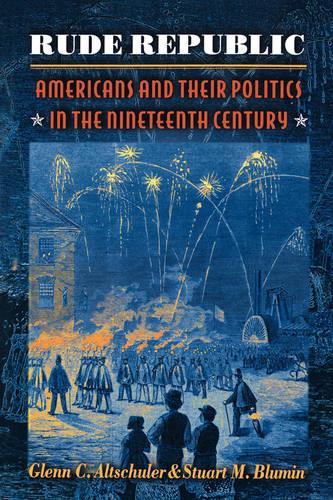
Rude Republic: Americans and Their Politics in the Nineteenth Century
(Paperback)
Publishing Details
Rude Republic: Americans and Their Politics in the Nineteenth Century
By (Author) Glenn C. Altschuler
By (author) Stuart M. Blumin
Princeton University Press
Princeton University Press
23rd October 2001
United States
Classifications
Professional and Scholarly
Non Fiction
Political ideologies and movements
320.97309034
Physical Properties
Paperback
328
Width 152mm, Height 235mm
454g
Description
What did politics and public affairs mean to those generations of Americans who first experienced democratic self-rule Taking their cue from vibrant political campaigns and very high voter turnouts, historians have depicted the nineteenth century as an era of intense and widespread political enthusiasm. But rarely have these historians examined popular political engagement directly, or within the broader contexts of day-to-day life. In this bold and in-depth look at Americans and their politics, Glenn Altschuler and Stuart Blumin argue for a more complex understanding of the "space" occupied by politics in nineteenth-century American society and culture. Mining such sources as diaries, letters, autobiographies, novels, cartoons, contested-election voter testimony to state legislative committees, and the partisan newspapers of representative American communities ranging from Massachusetts and Georgia to Texas and California, the authors explore a wide range of political actions and attitudes.They consider the enthusiastic commitment celebrated by historians together with various forms of skepticism, conflicted engagement, detachment, and hostility that rarely have been recognized as part of the American political landscape. Rude Republic sets the political parties and their noisy and attractive campaign spectacles, as well as the massive turnout of voters on election day, within the communal social structure and calendar, the local human landscape of farms, roads, and county towns, and the organizational capacities of emerging nineteenth-century institutions. Political action and engagement are set, too, within the tide of events: the construction of the mass-based party system, the gathering crisis over slavery and disunion, and the gradual expansion of government (and of cities) in the post-Civil War era. By placing the question of popular engagement within these broader social, cultural, and historical contexts, the authors bring new understanding to the complex trajectory of American democracy.
Reviews
"This book is one of the most significant (and certainly most original) studies of American political history to appear in the last twenty years... [The authors] have written an original, thought-provoking, and persuasive book... [A] path-breaking study."--Tyler Anbinder, American Historical Review "This is a genuine paradigm-shifting book about the nature of political participation in the nineteenth-century United States... The aftermath of this book should be a deep rethinking of popular political participation in the United States."--Philip J. Ethington, The Journal of American History "Rude Republic is an interesting and at times entertaining book... The historical details are often fascinating."--Paul Giles, Times Literary Supplement "This book offers an impressive in-depth analysis of politics and society in America's first experience with democratic self-rule."--Library Journal "A rich and entertaining study."--Publishers Weekly "A substantial, valuable study."--Kirkus Reviews
Author Bio
Glenn C. Altschuler is Dean of the School of Continuing Education and Summer Sessions and the Thomas and Dorothy Litwin Professor of American Studies at Cornell University. His books include Revivalism, Social Conscience, and Community in the Burned Over District and Better than Second Best: Love and Work in the Life of Helen Magill. Stuart M. Blumin is Professor of American History at Cornell University and the Director of Cornell-in-Washington. He has written several books, including The Emergence of the Middle Class: Social Experience in the American City, 1760-1900.
